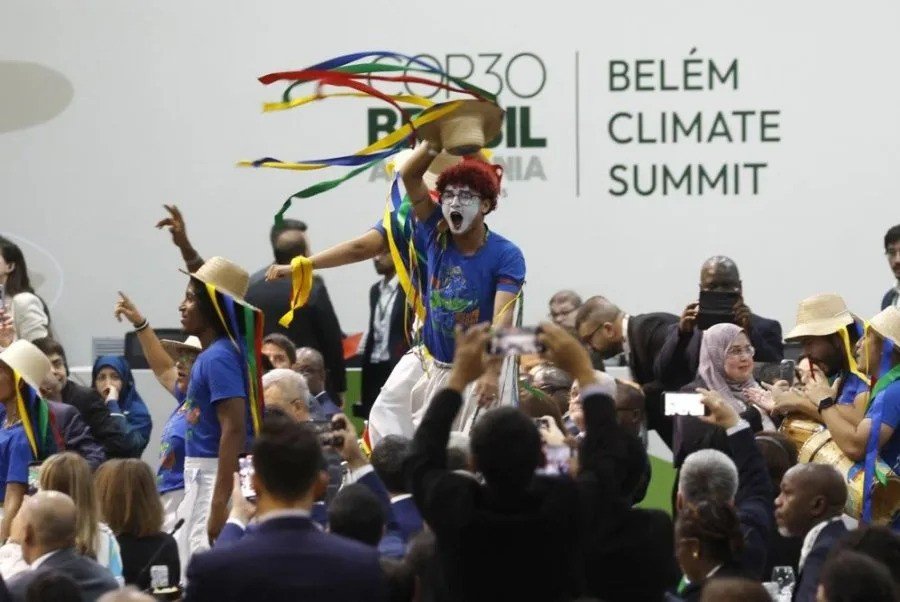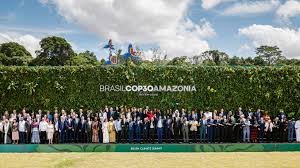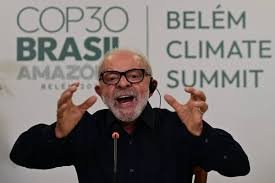
The first two days of the Leaders’ Summit at COP30 saw a mix of high-level rhetoric, new commitments and creeping concern that the global response to climate change remains under-powered. While host country Brazil galvanized a spotlight on tropical forest protection, the absence or low-level participation of major emitters raised alarm about the prospects of meaningful progress. Among the highlights: an ambitious forest-finance fund, sharp warnings from the UN, and renewed calls for adaptation and just transition. Yet the gap between ambition and delivery remains wide.

Key Highlights & Developments
The Forest Fund Steals the Spotlight
Host President Luiz Inácio Lula da Silva unveiled the “Tropical Forests Forever Facility” aimed at compensating developing countries that preserve intact forests. According to reports, Norway pledged about USD 3 billion toward the fund. ? Brazilian officials say the fund could attract broader private-sector participation and target USD 125 billion over three years. ?
Stern Warnings from the UN
António Guterres, UN Secretary-General, delivered a stark message: “The hard truth is that we have failed to ensure we remain below 1.5 degrees… This is moral failure – and deadly negligence.”
He stated the time for negotiations has passed: “This COP must ignite a decade of acceleration and delivery.”

Calls for True Multilateralism and Urgent Action
China’s Vice Premier Ding Xuexiang said: “It is imperative for all parties to uphold true multilateralism, strengthen solidarity and coordination and make sustained progress in global climate governance.”
Irish Prime Minister Micheál Martin remarked: “At a time when political leadership has never been more vital, there are fewer of us here in Belém. Fewer leaders ready to tell it as it is.”
Chile’s President Gabriel Boric criticized climate denial: “The President of the United States … said that the climate crisis does not exist, and that is a lie.”
Adaptation & Finance Under the Microscope
The gap between commitments and action seemed to dominate discussions on adaptation and climate finance. Many developing country delegates pressed for concrete funding flows and mechanisms to support vulnerable nations, rather than broad declarations. The first two days have been used to set the stage for the deeper negotiations to follow.

Missing Leaders, Mixed Signals
The absence or minimal representation of major emitters (notably the U.S., China, India) underscored concerns about collective leadership. Some participants voiced the risk that without these players fully engaged, any outcome may lack the scale required.
What It Means for Bangladesh and Other Vulnerable Nations
• The emphasis on forest protection opens opportunities for countries rich in natural carbon sinks to secure financial and technical support.
• Yet adaptation funding remains a major question: if developed nations do not accelerate disbursements, countries like Bangladesh may face widening finance gaps.
• The push toward private-sector financing, innovative mechanisms and just transition frameworks signals a shift in expectations — vulnerable nations will need to prepare for new models of climate cooperation.
Looking Ahead: What to Watch
• Detailed commitments: On what scale will developed countries commit to adaptation, loss & damage and mitigation by the end of COP30?
• Forest fund operationalization: Will the Tropical Forests Forever Facility’s pledges translate into signed agreements and disbursements?
• Major emitter engagement: Will the absence of full representation by key emitters hamper consensus-building or stimulate alternative coalitions of the willing?
• Implementation road-map: Will Belém conclude with a clear pathway to bridge the ambition gap toward 1.5 °C, and include measurable indicators for adaptation?
• Private-sector & innovative finance mechanisms: How will negotiations treat new instruments (taxes on wealth, shipping, airlines, debt-for-nature swaps) and what role will vulnerable countries play?
Conclusion
Days 1 and 2 of the COP30 Leaders’ Summit have set an ambitious agenda and raised expectations, but they also highlighted the key stumbling blocks ahead: meaningful finance, full participation of major emitters, and rapid transition from words to action. For vulnerable countries like Bangladesh, the summit offers both opportunity and urgency — opportunity to align with new initiatives, and urgency to ensure their voices are heard and needs addressed. The real test lies ahead as negotiations deepen and concrete decisions are required.



